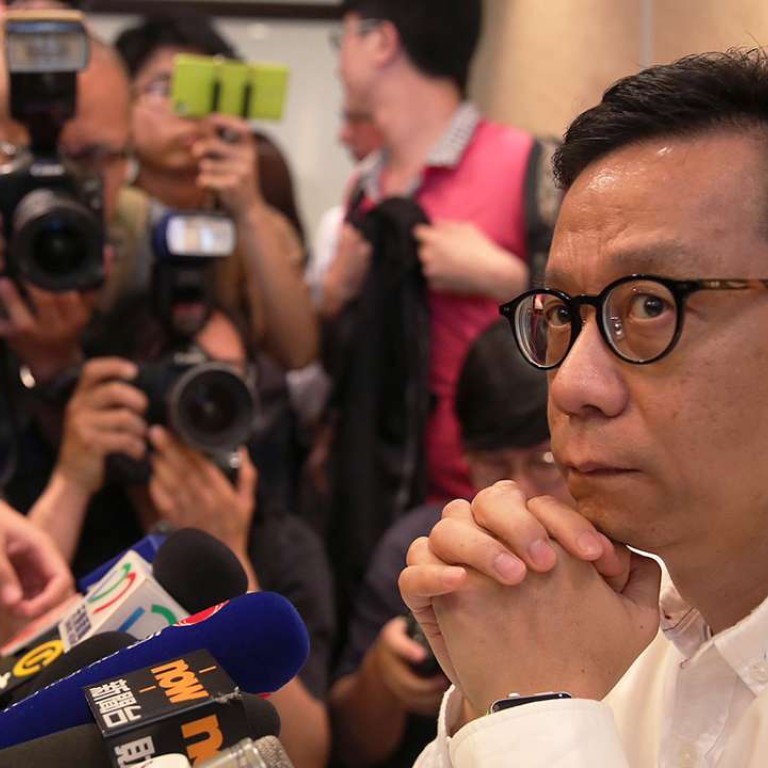
HKTV’s Ricky Wong plans to run in Legco elections, with CY Leung’s exit as key campaign platform
Entrepreneur may contest geographical constituency in New Territories East or Hong Kong Island
Technology and media entrepreneur Ricky Wong Wai-kay, known for his flair for springing surprises on his rivals, is planning to run in the Legislative Council elections in September.
Confirming that he planned to contest a geographical constituency, Wong, 54, said he was considering running in New Territories East or Hong Kong Island, with the latter being more likely.
“I live on Hong Kong Island, and the voter profile in the constituency is similar to my own background,” he said.
A new chief executive next year would be “one of the key agendas” of my forthcoming election platform, he added.
Wong said if Leung Chun-ying served another five-year term, the split in the community would worsen, and the hatred between the government and a substantial segment of Hongkongers would increase.
Hong Kong is sinking, and our city is at a crossroads.
“Hong Kong is sinking, and our city is at a crossroads,” he said. “We must sound out our views to Beijing.”
Wong was a member of the Liberal Party from 1993 to 1996.
He supports the introduction of universal suffrage as soon as possible, but disagrees with calls for Hong Kong independence, though he supports the idea of self-determination.
“The importance of my business and the prospect of a free-to-air TV licence can’t compare with the overall interests of Hong Kong society,” he said at a media gathering today.
“Hong Kong has given me a lot of opportunities, and I strongly feel I need to take up this mission – preventing Leung from serving another term.”
Wong said he hoped other candidates would state clearly if they backed a second term for Leung.
Labour Party lawmaker Cyd Ho Sau-lan, who holds a seat in Hong Kong Island constituency, encouraged Wong to throw his hat into the ring.
“In the past, we have criticised the business sector for free riding politically by using their connections with the government to enhance their business interests,” she said. “Through direct election, they would get to know more about difficulties faced by the public.”
Most people would oppose CY [Leung] serving another term. I believe most candidates would not openly say they supported CY.
Ho declined to predict how Wong’s candidacy could affect her campaign, saying only that: “With more people from different backgrounds and stances taking part in the election, it would only encourage me to work harder.”
And in response to Wong’s platform, Ho said calling for Leung to be replaced would not give him any particular advantage.
“Most people would oppose CY [Leung] serving another term. I believe most candidates would not openly say they supported CY,” she said.
In October 2013, the Executive Council denied Wong’s HKTV the free-to-air television licence he craved, sparking public uproar and protests.
Wong criticised the ruling as a “decision made in the dark” and launched a judicial review afterwards.
In April last year, the Court of First Instance ruled that the decision was unlawful as Exco had failed to follow the pro-competition 1998 reform – banning preset limits on the number of licensees – when it rejected the HKTV application. This meant that Exco had to reconsider the application.
But Wong’s long-running battle to secure a share of the free-to-air television market suffered another setback last month as the Court of Appeal quashed the Court of First Instance’s ruling.
Wong has launched HKTV as an online entertainment and shopping venture.
In an interview with the Chinese-language publication iMoney in February, the businessman said he had pondered the possibility of running in the Legco election and expected the odds of winning a seat to be “more than 50 per cent”. But he subsequently dropped the idea.
This would not be the first time Wong has gone through a baptism of fire in local elections. He won in the information technology subsector in the Election Committee polls in 2006 and 2011. The panel, dominated by members of the professional and business elite, selected the chief executive in 2007 and 2012.
Wong had previously tried to contest the information technology functional constituency in 1998, but his nomination was declared invalid because of his foreign nationality. He gave up his Canadian citizenship in February this year.
Wong, who graduated from the Chinese University in 1985, set up City Telecom in 1992. The company provided an alternative IDD service with call-back technology in Hong Kong that brought about the subsequent collapse of the monopoly of the market seven years later.
Wong also briefly served as ATV’s chief executive – for 12 days. At his inaugural press conference after assuming the post in 2008, Wong said that as a Hongkonger he only knew how to run ATV as a local station, and he would not manage it like state-run China Central Television. This reportedly prompted some mainland advertisers to pull their commercials.
Additional reporting by Owen Fung

